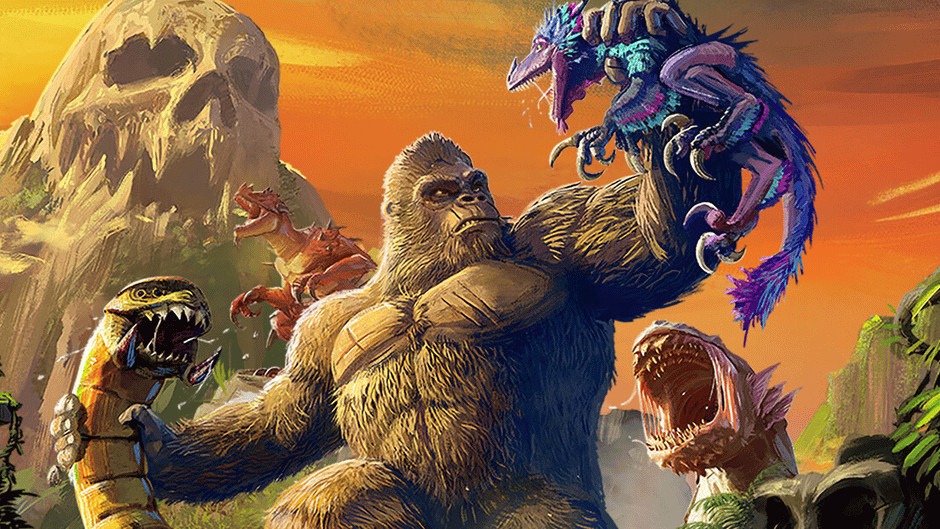(Not so) King Kong: Skull Island – overworked developers and unfinished games
King of the Monsters? Perhaps not. After almost two decades since Ubisoft’s tie-in for Peter Jackson’s King Kong, the ape returned with a whimper but rather than a roar as IguanaBee’s Skull Island: Rise of Kong saw ridicule upon release. It is not hard to see why. Aside from being as IGN claimed, “ugly and full of bugs” with “no meaningful attempts to do anything new”, one particular cutscene took the cake. What should have been a traumatic flashback for Kong as he recalled his Mother’s death at the hands of purple dinosaur Gaw (not Barney, like it would have made a difference) was instead a viral Twitter laughing stock, delivered via a badly-rendered static JPEG. For any video-games’ antagonist to be akin to a “broken animatronic” on a “long-forgotten Disney ride” as Kotaku’s Zack Zwiezen put it is hardly the end-goal for any developer. Yet IguanaBee are still, in one developers words, “proud of [their] monkey” – which begs the question why they were gifted the license initially. In reality, the blame does not lie with these overworked developers but the industry as a whole – their unfinished games the result of systemic flaws desperate for renegotiation.
For the unassuming IguanaBee, an independent indie studio based in Santiago, Chile, the intense backlash was expected. Acting as a subsidiary for the publisher – a larger Minnesotan studio ironically named GameMill Entertainment – the developers detailed for The Verge how restrictive circumstances such as a year-long developmental process hampered by access to limited information (due to licensing) accumulated in an unfortunate viral mess, since the game was effectively started from scratch by “two to twenty people working on it at a time”. Gamemill’s catalogue of poorly-reviewed games has become notorious, their practice of using small developers to quickly churn out cinematic cash-ins undoubtably haphazard. Yet their very existence is indicative of a dying part of the industry.
without being outsourced such a valuable contract, who knows whether the studio would have survived another year?
As technological advances in both console and desktop capabilities bolster consumer expectations of quality annually, there is increasingly less room for less polished and less financially risky games. Though difficult to blame consumers for not wanting to pay current market prices for unsatisfactory indie products, equally, GameMill are a last bastion against Triple A monopolies. Yes, IguanaBee may not have been provided the finances for a game suitable for expectations, but without being outsourced such a valuable contract, who knows whether the studio would have survived another year? It could well have been all GameMill could offer – prolonged developmental cycles inhibiting higher costs ever more frequent in the industry. Unfortunately, such a vicious cycle means everybody gets hurt. Consumers won’t recognise the talent behind IguanaBee – proven by their award-winning What Lies in The Multiverse – Best Game: Latin America at the Best International Games Festival. To create such quality, games like Skull Island: Rise of Kong become necessary – yet with it in their portfolio, they are again approached to create more licensed products at an increasing crunch.
The timing perhaps couldn’t have been worse, with Nintendo dropping Super Mario Bros. Wonder three days later to much critical acclaim. Of course, from a developmental perspective, these games are not comparable. Yet with reviews lauding Wonder’s creativity as “unapologetically wasteful”, the recycled skill trees and cut-and-paste level design of Skull Island: Rise of Kong will fail to imprint on consumers who have Wonder’s conceptual slash-and-burn of gimmicks (enough for one title alone) fresh in their minds. The choice, therefore, of “AND”, not of “OR”, implicitly boils down to the working standards implemented by Nintendo, whereby developers were gifted almost free-reign. In an interview with Wired, Producer Takashi Tezuka revealed that Super Mario Bros. Wonder had no deadlines for development, thus allowing the makers to work at their own pace and stimulate their creative juices – “regardless of what part of the game they were working on” or “how many years they’[d] been working at Nintendo”.
One positive, therefore, is that the industry appears to be moving in the right direction. After accusations of ‘Frat Boy Culture’ at Rockstar Studios – which welcomed toxic practices such as 55–60-hour work weeks (six 10-hour days a week) of salaried workers with no compensation whilst higher-ups drank at strip-clubs – management firings alongside changing schedule structures cultivated a healthier workspace as immediate time-off was gifted for every hour worked. Equally weighed down by misogyny and crunches which meant co-founder David Brevik almost missed the birth of his child, Activision Blizzard saw its subsidiary Raven Software strike due to firings in its Quality Assurance team and subsequently unionise (at much dismay to the leading Americans). The Game Workers Alliance represents a large industry step since entry-level QA positions are frequently exploited via furlough to skirt full-time employment regulations. Upon the acquisition of Activision Blizzard by Microsoft last April, a labour-neutrality agreement with Communications Workers of America demonstrates these new precedents are here to stay.
Ultimately, the question becomes a matter of how this is transferred beyond Triple A studios so as to co-opt smaller studios into larger projects – whilst equally giving them the time and space to create something worthwhile which could then in turn fund their own passion projects. Sadly, the Skull Island IP – a bright and colourful sandbox inhabited by monsters conceptually bursting with creativity – conveys a vibrant potential possessed by IguanaBee themselves. Unfortunately, in a fitting metaphor both game and creator had this life squeezed out by industry constraints. Though the game lacks longevity, its example certainly does not.

Comments